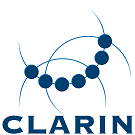K-Dutch: Difference between revisions
| Line 8: | Line 8: | ||
This page provides an overview of which services we cater to whom. We will store answers to questions we receive in this wiki, which will grow into a repository of K-Dutch answers to your questions. | This page provides an overview of which services we cater to whom. We will store answers to questions we receive in this wiki, which will grow into a repository of K-Dutch answers to your questions. | ||
* [[ | * [[Linguisitic topics]] about Dutch | ||
* [[CLARIN resource families]]: corpora, and lexica for Dutch | * [[CLARIN resource families]]: corpora, and lexica for Dutch | ||
* [[Language Processing]] tools for Dutch | * [[Language Processing]] tools for Dutch | ||
Revision as of 12:49, 9 March 2021
Mediawiki:Mainpage
Welcome to K-DUTCH, the place for anyone who wants to know anything about the Dutch language: linguistic properties, language advice, available tools and resources, etymology, dialects...
K-Dutch is (will be soon) a CLARIN Knowledge Centre. It is hosted by the Instituut voor de Nederlandse Taal (Dutch Language Institute) , which is also a CLARIN-B centre and host of many resources for Dutch, which are, in general, freely available for research purposes.
Services
This page provides an overview of which services we cater to whom. We will store answers to questions we receive in this wiki, which will grow into a repository of K-Dutch answers to your questions.
- Linguisitic topics about Dutch
- CLARIN resource families: corpora, and lexica for Dutch
- Language Processing tools for Dutch
- Types of services offered
Data types covered
Texts, Language models, Dictionaries, Treebanks, Wordnets, Linked open data, Ontologies
Generic topics covered, not connected with specific languages
Artificial intelligence, Natural language processing, Machine learning, Data mining, Lexicography, Linked data
Targeted audience
The INT CLARIN K-center is targeted towards all people interested in any aspects of the Dutch language, such as Computational linguists, Linguists, Language teachers, Historians, Library staff, Sociologists, Citizen scientists
Modalities covered
Right now, our resources cover text, and audio. We are also planning to include video corpora.
